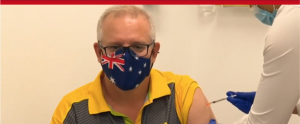AONTÚ SAYS NEW NI PUBLIC HEALTH BILL WOULD ALLOW FORCED VACCINATIONS

Aontú has taken issue with draft provisions of a new Public Health Bill in Northern Ireland that they say would grant “powers to detain people in hospitals and require persons to take vaccinations against their will”.
Aontú’s Deputy Leader, Gemma Brolly, told Gript that the proposals for the new Public Health Bill in the north which the Department says seek to update public health legislative framework in order that Northern Ireland can respond to 21st century public health emergencies, “includes provision to deprive persons of their liberty as part of regulations in response to a ‘threat to public health’.”
Pointing to page 47 of the draft provisions Mrs Brolly took issue with proposals which could “require a person to be vaccinated” and be “removed to” or “detained in” a hospital.
“The Department of Health are currently holding a consultation on possible inclusions in a new Public Health Bill. Within its provisions, the consultation document outlines that regulations may be included in legislation that may permit warrants to the Public Health Agency to enter premises by force, to impose a ‘special restriction or requirement’ such as requiring a person to be vaccinated, for them to be detained in a hospital or that the person may well be subject to restrictions as to where a person may go or with whom the person has contact,” she said.
A foreword from Mike Nesbitt MLA, the Minister for Health in Northern Ireland, says that the overarching principle of the draft Bill now open to public consultation “is to protect the population against various forms of infection and contamination including biological, chemical and radiological, in addition to infectious diseases, which is the focus of the 1967 Act.”
However, Ms Brolly said that the proposed measure would clash with the rights of individuals to their liberty. “This legislation can never materialise,” she said, describing any such measures involving compulsion as an erosion of freedom.
“This language is absolutely unacceptable,” she said. “It is born of Orwell, and oversteps any lawful authority that any Government has even during a public health emergency.”
“Moreover this is an extremely concerning infringement on human rights. Aontú absolutely oppose the inclusion of these draconian provisions within any legislation, and we would go further and ask how the Health Minister could approve this consultation. He should rescind this document immediately and seriously ask if these officials genuinely think that these provisions are realistic, legal or enforceable,” she said.
In response to Ms Brolly’s comments, Health Minister Mike Nesbit said: “My department acknowledges the interest and concerns that have been raised regarding the policy proposals that are currently out for consultation and which may underpin a new Public Health Bill.”
“The overarching principle of the proposed legislation is to protect the population against various forms of infection and contamination including biological, chemical and radioactive, in addition to infectious diseases, which is the focus of the current Public Health Act (Northern Ireland) and dates back to 1967.”
“Our public health legislation needs to be fit for purpose in order that Northern Ireland can respond to 21st century public health emergencies. New public health legislation will also better comply with Human Rights and Data Protection legislation as well as WHO International Health Regulations (IHR) 2005 to which the UK is a signatory. Additionally, it will also help us align where appropriate on a 4 Nations basis in responding to public health emergencies.”
“In responding to public health emergencies, powers in addition to those the PHA already has are proposed. In addition to ensuring any action is proportionate to the threat, a number of safeguards and protections are also proposed.”
“I would encourage people to respond to the consultation,” he added.
Page 48 of the document states that: “Specific provision will be made prohibiting regulations that impose or enable the imposition of a requirement that a person undergoes medical treatment” – but it asserts that “medical treatment does not include vaccination and other prophylactic treatment.”
The consultation summary says that it is proposed that the new Bill will:
• be based on the all-hazards approach, in alignment with other UK jurisdictions, for the protection of people from known or yet to be discovered hazards, infections or contamination;
• update certain powers around restrictions on employment, quarantine, isolation and medical examination;
• clarify roles and responsibilities for different authorities; and
• provide underlying human rights based principles under which powers of intervention would be exercised.
It says that a Review of the Public Health Act (Northern Ireland) 1967, including the 2015 public consultation, led the Department to the conclude that the main deficiencies in the existing 1967 Act are:
• the narrow scope of the Act, which is concerned almost exclusively with infectious diseases, whereas other jurisdictions and international law have adopted an ‘all hazards’ approach to protect the population against various forms of infection and contamination as well as infectious diseases;
• the Act is not consistent with World Health Organisation (WHO) International Health Regulations 2005 (IHR 20055), to which the UK is a signatory, and which places duties on Member States in relation to public health measures;
• the powers given to authorities may not be compatible with the Human Rights Act 1998, and new legislation could ensure that actions that interfere with individual freedoms are proportionate to the public health risk;
• the powers of entry and the roles of authorised officers in carrying out certain functions are unclear; and
• the list of notifiable diseases needs to be reviewed and updated to take account of public health threats that have emerged or become more apparent since 1967, e.g. Severe Respiratory Syndrome (SARS). Other UK jurisdictions have since added a list of notifiable organisms (causative agents) to their legislation, which places Northern Ireland out of alignment.
Source: https://gript.ie/aontu-says-new-ni-public-health-bill-would-allow-forced-vaccinations/








